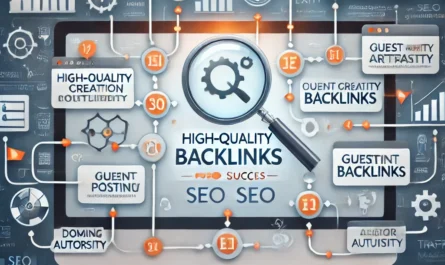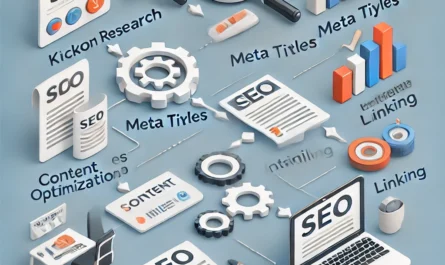If you’re looking for a way to boost your website’s organic traffic and improve search rankings, technical SEO might be the solution. Technical SEO refers to optimizing the technical elements of your website to help search engines crawl, index, and rank it more effectively. It might sound daunting, but applying these techniques is crucial to your site’s long-term success.
With the rise in competition and Google’s constant algorithm updates, mastering technical SEO techniques is essential for any business that wants to attract more visitors. This article will explore how you can increase organic traffic with technical SEO, covering essential methods like improving site speed, mobile optimization, and addressing common SEO errors that may be holding you back.
What Is Technical SEO?
Technical SEO involves optimizing the foundational elements of a website to enhance its visibility on search engine results pages (SERPs). While on-page SEO focuses on content, and off-page SEO targets backlinks and social signals, technical SEO is all about refining the underlying technology of your site to make it easier for search engines like Google to crawl and index your pages.
By improving technical aspects such as site speed, mobile-friendliness, security, and site architecture, technical SEO allows search engines to rank your site higher, which in turn drives more organic traffic.
Understanding Organic Traffic
Organic traffic refers to the visitors who land on your website through unpaid search results. It’s one of the most valuable types of traffic because users are actively searching for content related to your business. Unlike paid traffic, which comes from ads, organic traffic comes from users finding your website through search engines.
For your website to gain traction and sustain long-term growth, it’s vital to focus on strategies that drive organic traffic. Improving your technical SEO is one of the most effective ways to do this. By ensuring that your website is optimized for both search engines and users, you’ll notice an increase in traffic, engagement, and conversions.
The Relationship Between Technical SEO and Organic Traffic
The connection between technical SEO and organic traffic is undeniable. Search engines like Google rely on technical signals to determine how user-friendly and relevant your website is. If your site is slow, difficult to navigate, or filled with errors, search engines will be less likely to rank it highly. This, in turn, leads to fewer visitors and lower organic traffic.
By implementing technical SEO strategies, you’ll make your website easier to navigate for both search engines and users. When search engines can crawl your site efficiently and understand its content, they’re more likely to rank it higher, driving more organic traffic to your pages.
Improving Site Speed for Better Rankings
One of the most crucial technical SEO factors affecting organic traffic is site speed. A slow website not only frustrates users but also leads to higher bounce rates, lower conversions, and a significant drop in search rankings.
To improve site speed, consider the following steps:
- Optimize Images: Large images can slow down page loading times. Use compression tools to reduce file sizes without compromising quality.
- Minimize HTTP Requests: Reduce the number of elements on a page, such as scripts and images, to decrease load time.
- Enable Browser Caching: This allows visitors to store parts of your site on their devices so pages load faster on return visits.
Use tools like Google PageSpeed Insights or GTmetrix to analyze and improve your site speed. Fast-loading pages enhance user experience, improve rankings, and ultimately increase organic traffic.
Mobile-Friendliness: The Key to Traffic Growth
As mobile devices account for a growing share of web traffic, having a mobile-friendly website is crucial for organic growth. Google has adopted a mobile-first indexing approach, meaning that it predominantly uses the mobile version of your site for indexing and ranking.
To ensure your website is mobile-friendly, follow these best practices:
- Responsive Design: Your site should automatically adjust to fit different screen sizes, providing a seamless user experience.
- Optimize Touch Elements: Make buttons and links large enough to tap comfortably on mobile devices.
- Improve Mobile Page Speed: Compress images, eliminate unnecessary code, and enable AMP (Accelerated Mobile Pages) to speed up mobile browsing.
A well-optimized mobile site can significantly increase your organic traffic, as search engines prioritize mobile-friendly websites in search results.
HTTPS and SSL Certificates
Security is another key technical SEO factor that directly impacts organic traffic. Google favors secure websites, and implementing HTTPS with an SSL certificate is an absolute must. HTTPS not only protects your site and users’ sensitive information but also gives your website a ranking boost.
If your site isn’t secure, search engines and browsers will mark it as “not secure,” deterring visitors from accessing it. This can lead to a decrease in traffic, engagement, and conversions. To avoid this, ensure that your website has a valid SSL certificate and all URLs are updated to use HTTPS.
The Role of Structured Data in Technical SEO
Structured data is a technical SEO technique that helps search engines better understand the content on your site. By adding structured data (schema markup) to your web pages, you can enhance how your content appears in search results with rich snippets, such as star ratings, images, and additional information.
Rich snippets make your search result stand out, leading to a higher click-through rate (CTR) and more organic traffic. Implementing schema markup allows search engines to serve users more relevant and useful information about your content, which helps improve your overall rankings and visibility.
You can also read; How to Build High-Quality Backlinks for Better Search Rankings
Optimizing Crawl Budget for Organic Traffic
Your crawl budget is the number of pages search engines will crawl on your site within a given timeframe. If your crawl budget isn’t optimized, search engines may not be able to index all of your pages, which can hurt your organic traffic.
Here are some tips to optimize your crawl budget:
- Fix Broken Links: Ensure that all internal and external links are functioning correctly.
- Consolidate Duplicate Pages: Avoid having multiple versions of the same content.
- Improve Site Architecture: Organize your site logically to make it easier for search engines to crawl.
Managing your crawl budget efficiently ensures that search engines index all your important pages, helping you maximize your organic traffic potential.



